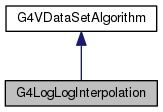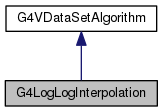#include <G4LogLogInterpolation.hh>
Definition at line 53 of file G4LogLogInterpolation.hh.
| G4LogLogInterpolation::G4LogLogInterpolation |
( |
| ) |
|
| G4LogLogInterpolation::~G4LogLogInterpolation |
( |
| ) |
|
Implements G4VDataSetAlgorithm.
Definition at line 57 of file G4LogLogInterpolation.cc.
62 G4int nBins = data.size() - 1;
76 if ((d1 > 0.) && (d2 > 0.) && (e1 > 0.) && (e2 > 0.))
83 value = std::log10(d1)+(std::log10(d2/d1)/std::log10(e2/e1)*std::log10(
x/e1));
84 value = std::pow(10.,value);
const XML_Char int const XML_Char * value
Implements G4VDataSetAlgorithm.
Definition at line 114 of file G4LogLogInterpolation.cc.
121 G4int nBins = data.size() - 1;
128 else if (
bin < nBins)
144 value = log_d1 + (log_d2 - log_d1)*(log_x - log_e1)/(log_e2 - log_e1);
147 value = std::pow(10.,value);
const XML_Char int const XML_Char * value
The documentation for this class was generated from the following files:


 Public Member Functions inherited from G4VDataSetAlgorithm
Public Member Functions inherited from G4VDataSetAlgorithm